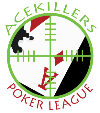Pots / Showdown
Cards speak to determine the winner. Verbal declarations of hand value are not binding at showdown but deliberately miscalling a hand may be penalized. Dealers should read and announce hand values at showdown. Any player, in the hand or not, should speak up if he or she thinks a mistake is made in reading hands or calculating and awarding the pot.
A: Proper tabling is both 1) turning all cards face up on the table and 2) allowing the dealer and players to read the hand clearly. “All cards” means both hole cards in hold’em, all 4 hole cards in Omaha, all 7 cards in 7-stud, etc.
B: At showdown players must protect their hands while waiting for them to be read (See also Rule 66). Players who don’t fully table all cards, then muck thinking they’ve won, do so at their own risk. If a hand is not 100% retrievable and identifiable and the TD rules it was not clearly read, the player has no claim to the pot. The TDs decision on whether a hand was sufficiently tabled is final.
C: Dealers cannot kill a properly tabled hand that was obviously the winner.
Discarding non-tabled cards face down does not automatically kill them; players may change their minds and table cards if they remain 100% identifiable and retrievable. Cards are killed by the dealer when pushed into the muck or otherwise rendered irretrievable and unidentifiable.
A: If a player tables one card that would make a winning hand, the dealer should advise the player to table all cards. If the player refuses, the floor should be called.
B: If a player bets then discards thinking he or she has won (forgetting another player is still in the hand), the dealer should hold the cards and call the floor. If the cards are mucked and not retrievable and identifiable to 100% certainty, the player has no redress and is not entitled to a refund of called bets. If the player initiated a bet or raise and hasn’t been called, the uncalled amount will be returned.
All hands will be tabled without delay once a player is all-in and all betting action by all other players in the hand is complete. No player who is either all-in or has called all betting action may muck his or her hand without tabling. All hands in both the main and side pot(s) must be tabled and are live. See Illustration Addendum.
A: In a non all-in showdown, if cards are not spontaneously tabled or discarded, the TD may enforce an order of show. The last aggressive player on the final betting round (final street) must table first. If there was no final round bet, the player who would act first in a final betting round must table first (i.e. first seat left of the button in flop games, high hand showing in stud, low hand in razz, etc.).
B: A non all-in showdown is uncontested if all but one player mucks face down without tabling. The last player with live cards wins and is not required to table the cards.
A: Players not still in possession of cards at showdown, or who have mucked their cards face down without tabling, lose any rights or privileges to ask to see any hand.
B: If there was a river bet, any caller has an inalienable right to have the last aggressor’s hand tabled on request (“the hand they paid to see”) provided the caller tabled or retains his or her cards. TDs discretion governs all other requests such as to see the hand of another caller, or if there was no river bet. See Illustration Addendum [adopted 2013].
To play the board, a player must table all hole cards to get part of the pot (See Rule 13-A).
First, odd chips will be broken into the smallest denomination in play. A) Board games with 2 or more high or low hands: the odd chip goes to the first seat left of the button. B) Stud, razz, and if 2 or more high or low hands in stud/8: the odd chip goes to the high card by suit in the player’s 5-card winning hand. C) H/L split: the odd chip in the total pot goes to the high side. D) If identical hands win both high and low (ex: 2 Omaha/8 wheels) the pot is split as evenly as possible. See Illustration Addendum.
Each side pot will be split separately.
The reading of a tabled hand may be disputed until the next hand begins (see Rule 23). Accounting errors in calculating and awarding the pot may be disputed until substantial action occurs on the next hand. If a hand finishes during a break, the right to any dispute ends 1 minute after the pot is awarded.
